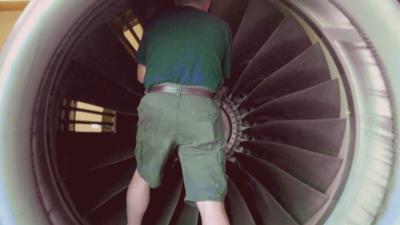Introduction
January 18, 2011

In a follow-up to Flying Cheap, the hard-hitting investigation into major airlines' outsourcing of flights to obscure regional airlines, FRONTLINE and the Investigative Reporting Workshop examine another growing trend: the outsourcing of major airline repair work to lower-cost independent maintenance operations in the U.S and abroad.
Most major airlines outsource the majority of their heavy maintenance, some as much as 70 percent or more. "Maintenance traditionally has been sacrosanct. It was one area where the industry collectively said, 'No,' that's not something we can cut," says Bill McGee, a consumer advocate on the Department of Transportation's Future of Aviation advisory committee. "In recent years we've seen a change, and I don't think we've yet seen all the manifestations of that change."
Correspondent Miles O'Brien explores this new world of outsourced contract maintenance, focusing first on international MROs -- short for maintenance, repair and overhaul companies -- at a conference in Phoenix, Ariz. As a forum for companies to market their services to U.S. airlines, two benefits are touted: quality work and cheap labor.
FRONTLINE wanted to investigate further, and was invited to visit AMECO, one of Asia's largest MROs, in Beijing, which overhauls United Airlines' wide-bodied fleet [Boeing 747 and 777]. FRONTLINE wanted to talk with workers about the quality of their workforce, the competitiveness of the industry and their regulatory compliance records. AMECO cancelled the trip at the last minute.
FRONTLINE also investigates ST Aerospace Mobile in Alabama, which now does heavy repair work for several major airlines, including United Airlines, Delta Air Lines and US Airways. Through interviews with company mechanics and an examination of both government and company records, the investigation raises serious questions about the quality and experience of the workforce; the use of foreign workers with limited English proficiency; and the alleged use of unauthorized airline parts. One ST employee worries that the current system of maintenance and repair will end in "a smoking hole at the end of the runway."
After watching footage of FRONTLINE's interviews with mechanics at ST Aerospace in Alabama and reading company documents, veteran FAA inspector Linda Goodrich tells FRONTLINE, "Something's seriously wrong here, and we need to investigate this."
Others, however, tout the airline industry's impressive safety record as evidence that the system is working. Peggy Gilligan, the FAA's associate administrator for aviation safety, points to the fact that "over the last 10 or 12 years we have actually reduced the risk in aviation by over 80 percent for fatal accidents. So if anything, we have expanded safety margins."
COMMENTS
blog comments powered by DisqusIn order to foster a civil and literate discussion that respects all participants, FRONTLINE has the following guidelines for commentary. By submitting comments here, you are consenting to these rules:
Readers' comments that include profanity, obscenity, personal attacks, harassment, or are defamatory, sexist, racist, violate a third party's right to privacy, or are otherwise inappropriate, will be removed. Entries that are unsigned or are "signed" by someone other than the actual author will be removed. We reserve the right to not post comments that are more than 400 words. We will take steps to block users who repeatedly violate our commenting rules, terms of use, or privacy policies. You are fully responsible for your comments.